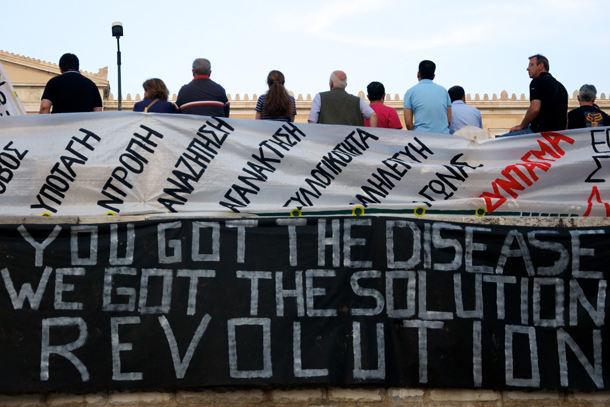At the birthplace of the philosophies of our modern way of life, I witnessed the beginning of a global insurrection.
As I prepared my breakfast at a hostel in Athens, I sat and watched the morning news shows. A well-dressed lady held up the morning newspapers, traced her finger along each headline and read them off. The Greek budget crisis, it was apparent, had also affected the national supply of teleprompters. Every page featured scenes of angry people in large gatherings, or pictures of concerned men in meetings.
After each reading, the anchors momentarily appeared on screen to segue into video from protests the night before. Thousands of youth held up signs and hurled garbage at police in the student town of Thessaloniki. On the island of Crete in Heraklion, they gathered around the main square, crippling traffic. In Athens, they surrounded the Greek Parliament. Athenian youth followed the example of fellow protestors in Spain, occupying Syntagma square in the centre of the city, setting up tents. Each nation's protest movement bolstered the audacity of others.
Somewhere between the multitudes of roaming dogs set loose, because their owners had run out of money to care for them, and the restaurant owners desperately jumping at me to sit in their empty establishments bereft of money-laden tourists, I wondered why I visited a country that was collapsing. I thought I was visiting Europe, but this wasn't the Europe I'd expected. Greece was under-developing itself, right before my eyes. Perhaps the entire continent was unraveling as well.
A garden stroll
A visit to Spain the prior week demonstrated that Greece's financial woes were just the tip of an iceberg on a continent of debt -- the Greek national debt crisis seemed like the first card in a flimsy house. To be in a nation as it is unraveling has an eerie, surreal, mostly indescribable feeling. The storefronts in Athens outside of the tourist areas looked like they'd been through several rounds of a boxing fight, and were just waiting for the knockout punch. Other than the lights being on, the difference between shops closed indefinitely and those currently operating were hard to distinguish. Unless they were pushing merchandise, people wore saddened expressions as they walked by decaying and graffiti-covered buildings.
Seeking beauty, I wandered to the Greek National Gardens -- which grew mostly grass, shrubs and trees. Accustomed to Vancouver's beautiful lawns and front-yard gardens, maybe my expectations were a little high. Spotting a striking number of men watering the grass patches in the gardens, I remembered that 40 per cent of Greece's GDP results from the public sector. Even in a collapsing economy there are still business opportunities. The lawn and garden stores of Athens could certainly find a use for their supply of sprinklers. Riots mean hungry people, and lines of food carts ensured the energy expended in cursing national financial decisions could be quickly and inexpensively regenerated with cheap gyro pitas and grilled corn.
I was staying with a gracious CouchSurfing host in Athens who, despite a poorly paying job and diminishing future prospects, was still excited to show off the city's free jazz festival. It was obvious why the city threw its thinning financial resources into a public event like this; nothing takes the edge off of economic collapse like open air smooth jazz. Elevator music on an elevator heading down can still calm the ride.
It was a telling visit. On a mostly empty ferry ride, the bartender looked out into an empty lounge, and with a blank expression repeated the routine of repositioning unmoved chairs and washing unused glasses late into the night, more out of repetition than utility. It was perhaps the saddest thing I've ever seen -- employment had been reduced to shuffling chairs on a ship riding rough economic waters. Repetitive tasks were the only thing the employed could use to calm the mind.
This wasn't a theory from Limits to Growth computer models, or the writings of economic doomers that so frequently proclaim the fragility of the "global ponzi economy." The lessons of Greece resonate deeply. They're a small-scale example of the state of all economies in developed nations which sit on equally unmanageable piles of debt. Now, our national flags represent claims on these piles of debt more than perhaps anything else.

Greece is on the verge of becoming the first nation to default on its debt since Argentina in 2001 and Russia in 1998. The only hope Greece has of recovering from its current debt spiral is a return to economic growth, as it attempts to meet ever more desperate demands and targets to obtain new loan packages from the IMF and E.U. nations. This prospect seems ever more unlikely, with the nation's Finance Minister's recent announcement that GDP for 2011 will contract at a rate of more than 4.5 per cent, much higher than the expected contraction of only 3.8 per cent.
Though statistics rarely tell the whole story, a closer look at the Greek banks shows that in June alone, €3.8 billion was pulled out of the system by households and companies, bringing the total amount of money deposited in all of Greece's banks to just €188 billion. This is a 20 per cent decline in total Greek bank deposits since Jan. 2010. To put these numbers in context, an equivalent outflow in the U.S., based on the total $8 trillion in total domestic deposits, would imply a $160 billion monthly outflow -- enough to put Bank of Americas out of business twice over.
'It sounded like utopia'
Towards the end of the last decade, it was popular to proclaim Europe as an example of what we in North America could achieve. This notion was led by books such as Jeremy Rifkin's The European Dream, which described the difference between North American and European values. He argued that on the other side of the Atlantic, citizens found security not through individual accumulations of wealth but through connectedness, respect for human rights and sustainability.
It sounded like utopia. Politically, E.U. nations had acknowledged climate change and were implementing renewable energy policies that drove solar panel installations and wind farms. While visiting the clean energy infrastructure in Austria during 2008, I was convinced that many European nations were far more environmentally aware and better prepared for a future with less oil.
The Austrian government actively funded clean energy research and development. Many towns were centrally heated using hot water piped from a facility powered by methane captured from sewage, failing to recycle and compost carried a fine, waste was sorted amongst as many as seven different bins at households and business, and organic material from many towns I visited was sent to nearby compost piles and redistributed for farmers and gardeners. The wind farms that dotted the countryside picturesquely reiterated that these people surely must have more rational politics, and must be more forward looking. Overall, it was a dramatic vision of a nation that took sustainability seriously. This was what political will could achieve if it took energy scarcity and climate change seriously.
Though now, the insurrections of the Spanish Indignados, or disillusioned Greek and British youth, demonstrate that Europe is our future -- just not the future we'd dreamed of. A vivid image of economic deterioration which leaves unfulfilled the consumer desires installed in my generation since birth. Our collective expectation of an imagined future with fulfilling careers that delivered money we could use to realize the promised wonders of consumer goods has been dashed by the reality of financial limitations and banking crises. For youth in Canada, the unemployment rate is 14.4 per cent, double that of the overall national average. With nearly half of Spain's youth counted amongst the unemployed and Greece not terribly far behind at roughly 35 per cent, Canadian youth have a long way to go before we see occupying town squares as our only path forward. Yet the dream of landing a job early in our twenties and sustaining ourselves without the help of parents is becoming less a reality and more of a frustration for many.
Standard and Poor's downgrade of the U.S. is a dramatic milestone in the debt crisis facing global governments. But remember that Portugal, Ireland, Spain, Greece and Italy were all downgraded this year -- with France threatened by a downgrade in the near future. Canada is an excellent example of why a debt downgrade could be a manageable proposition. After being downgraded to AA+ in 1993, the Liberal government of Jean Chrétien embarked on an austerity plan which raised taxes, cut military spending by 15 per cent and overall federal spending by 20 per cent, leading to a return to AAA status in 2002. While the Canadian government's ability to make tough political decisions in order to re-establish fiscal responsibility is admirable, the timing couldn't have been better, as the world's economy boomed from a remarkable era of growth in profits from financial services and the influx of cheap goods from newly globalized economies, allowing the U.S. to buy even more of Canada's production.
Now, as the threat and reality of credit downgrades hits at the core of every developed nation, what seems more likely is a complete revision to our economic understanding as the old system no longer synchronizes with reality. In Lester Brown's latest book World On the Edge, he quotes Oysten Dahle, Exxon's former VP North Sea operations saying, "socialism failed because it could not tell the economic truth, and capitalism may fail because it cannot tell the ecological truth." Now, Canada's ability to supply the last gasp of raw materials needed to sustain this economic playbook means that we're draining our ecological capital, aligning our policies to pad our coffers in the service of a monetary system that has little chance of surviving the decade due to oil and resource depletion -- leading to ever higher costs of doing business.
Having described pathways to navigate this transition for many years, many of Canada's scholars have led global thought in adapting to the end of economic growth. From the de-growth economics of Peter Victor, the understanding of peak oil global economies as documented by Globe and Mail columnist Jeff Rubin, to the idea that we can harness these opportunities to enact creative social reform from Thomas Homer-Dixon in Canadian bestseller, The Upside of Down. Even local writers like Conrad Schmidt advocate policies that encourage us all to work fewer hours at our jobs which support this economic system, so that we can create a new one. Solutions to this conundrum exist, and many Canadians have been proposing them.
The end of capitalism might seem like the end of the world, but only because we haven't been listening to many of this nation's finest thinkers. Any anxiety we feel at this historic crossroads results because our expected living standards have been produced much like any other good in our consumer economy. Capitalism's true crisis results from our inability to imagine an alternative.
Uprising
As I stepped into Spain, the Puerta del Sol was being occupied for the first time by the Spanish Indignados. To support them, students poured into the square just a few blocks away from me in Granada. I was staying with an old friend from the U.S. who was lucky enough to find a job when he moved there two years prior. He explained that the unemployment rate in the Andalusia region was over 40 per cent. Nearly one out of every two people walking around was unemployed. After graduating from the universities, technically adept and aspiring information technology or engineering professionals would be fighting to find jobs that paid 800 euros a month. The average salary across Spain was a mere 1,000 euro per month. Many friends of his had left for the U.K. or had traveled across the U.S. and Canada searching for employment that had a decent level of compensation.

As I browsed the town, the local shops were mostly empty. The local politicians bragged that they had ended "entitlement payments" to airline companies which caused them to withdraw from the town's airport, dramatically impacting local merchants that relied on visitors to the incredible Moorish palace of the Alhambra. Students marched with megaphones and signs proclaiming the need for dramatic action against this economic injustice, politely ignored by happy tourists. A friend sent a text saying there would be the potential for conflict that evening, because an order for eviction of the public square at midnight had been issued. There may be tear gas, he said.
But when the clock struck 12:00, the thousands of Spaniards occupying the square jumped passionately in unison, chanting and cheering the fact that no riot police showed up. The Spanish youth had won the right to command public space, and in doing so created a marketing tool more powerful than any political candidate's advertising. They could not be ignored in the midst of Spain's election. Locals expected these protests to stop immediately after the election, yet as the country's economic situation deteriorates further, the Indignados have only become more coordinated and have spread their net wider.
Canada's fiscal ledger is currently in far better shape than the economies of European nations now racing to implement austerity measures before their ability to borrow becomes crippled. The sad paradox is that austerity further slows the growth the E.U. needs to pull out of their spiral, like a hamster wheel of government spending cuts that only goes around and around. To relieve these debt burdens, the defaults will have to start rolling in, bankrupting highly leveraged financial institutions across the world in the process. The consumer economy we've been groomed to participate is evaporating, leaving frustrated and unfulfilled youth in the process.
Shaken by looters in London, we ignore the underlying social dynamic, and by doing so we encourage more rioting in the future. Confronting this reality head on, we can integrate alternatives into our society and focus frustration with the system into adaptation, instead of reducing everything we've built to rubble. As an economic paradigm shifts forever, Europe truly is ahead of the game -- not in creating a future of social equity and climate change adaptation, but in co-ordinated movements of social unrest that confront the limits to economic growth before the general public in North America could even recognize what was happening. If only we could have used our imagination. ![]()
Read more: Travel, Rights + Justice

















Tyee Commenting Guidelines
Comments that violate guidelines risk being deleted, and violations may result in a temporary or permanent user ban. Maintain the spirit of good conversation to stay in the discussion.
*Please note The Tyee is not a forum for spreading misinformation about COVID-19, denying its existence or minimizing its risk to public health.
Do:
Do not: